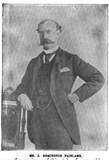- |
User Links
J. Remington Fairlamb › Texts

Mr. James Remington Fairlamb
| Short Name: | J. Remington Fairlamb |
| Full Name: | Fairlamb, J. Remington, 1838-1908 |
| Birth Year: | 1838 |
| Death Year: | 1908 |
Mr. J. Remington Fairlamb received his first musical instruction at the hands of his mother. Although he was exceedingly fond of his music, while very young he was more fond of “dreaming” than of “practicing” at the piano. But at the age of twelve the boy came across a copy of Spohr’s oratorio ”The Last Judgment,” which seems to have satisfied his craving and shaped his career. When fourteen years of age he obtained a position as organist of the Western Methodist church, the first of its denomination in Philadelphia to obtain an organ. He afterwards filled the same position in the Tabernacle Baptist Church and succeeded one of the best church musicians of that city as organist and choir master of the Clinton Street Presbyterian church. During his twentieth year Mr. Fairlamb went to Europe and studied first in Paris, the piano under Marmoutel, voice under Masset, and harmony under Danhauser; subsequently he continued his studies under Mabellin in Florence Italy. Returning to America about the outbreak of the Civil War, and being incapacitated for military service by defective eyesight, Mr. Fairlamb accepted the position of Musical Director of the Church of the Epiphany in Washington, D.C. Here he enjoyed the acquaintance of many notable people, including President and Mrs. Lincoln. Being appointed United States consul at Zurich in Switzerland by Mr. Lincoln, he returned to Europe and remained there four years. His compositions number about two hundred in all. His music is distinguishable by dramatic intensity and orchestral ideas. He has published a part of a romantic opera, “Valeri,” and a quartet opera, “Love’s Stratagem.” His songs published in “St. Nicholas Songs” and “Harper’s Young People,” are so simple, quaint and delicate that, says a prominent New York contralto, he would live had he composed nothing else, forever in these.” His “Cradle Song” is a worthy specimen of this style of composition. Mr. Fairlamb has charge of societies in Newburgh, Hudson and Catskill.
from The World's Best Music: Famous Songs and Those who Made Them Famous, Volume 1
By Frederic Dean, Reginald De Koven, Gerrit Smith
| No Texts by J. Remington Fairlamb |
|---|
| No texts are associated with this person. |


 My Starred Hymns
My Starred Hymns


